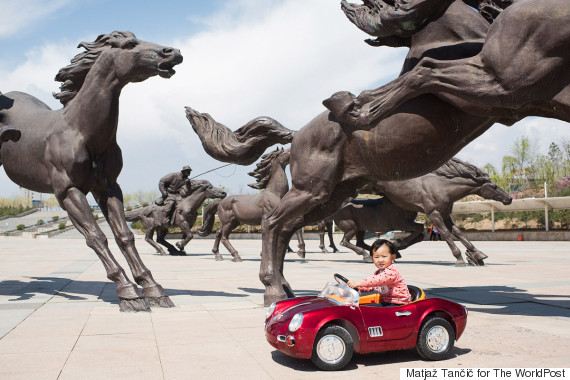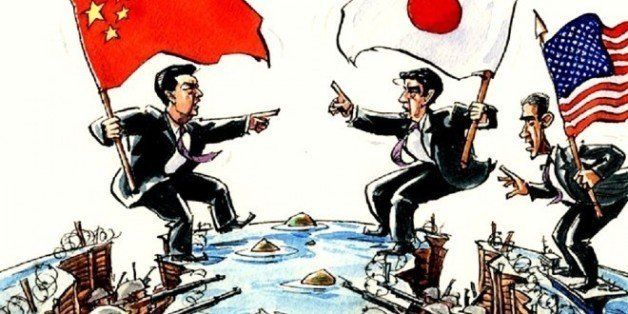Nathan Gardels is the editor-in-chief of Noema Magazine.
Is a new Cold War brewing in the Pacific between China and the U.S. with Japan playing a front line role? Prime Minister Shinzo Abe’s visit to Washington last week alarmingly pushed developments in that direction. In a blog he adapted from his well-received speech to the U.S. Congress, Abe proposes that the two democratic post-WWII allies join in a “seamless” strategic effort “to spread and nurture our shared values” and “stick to the path” that “won the Cold War” — and, in so many words not spoken, to contain China.
By excluding China, the world’s second largest economy, from the proposed Trans-Pacific Partnership on trade while embracing the revision of Japan’s pacifist constitution to allow military action beyond self-defense without an apology for colonialism and aggression acceptable to its Asian neighbors, the U.S. and Japan are laying the cornerstone of a new bloc system in the Pacific. As Minxin Pei writes, China’s leaders will certainly see it that way and respond in kind.
Writing from Tokyo, prominent Japan scholar R. Taggart Murphy traces Prime Minister Abe’s nationalist politics to the right wing stance of his grandfather, who was minister of munitions in the Tojo government during the war, and argues that Japan’s strategic choice under Abe is to remain an American “protectorate” in an alliance aimed at thwarting China’s ambitions in the region. Former UN Secretary General Kofi Annan hopes against such realities that world powers in the coming decade will stop seeing their interests in a zero-sum manner.
Marking the 70th anniversary of the end of WWII in Europe in 1945, Ian Buruma writes that the post-war consensus on a social democratic welfare state in Europe has fatally withered. On the eve of the now concluded British elections, British Prime Minister David Cameron — who ended up victorious at the polls — Labour Party challenger Ed Miliband and rebel comedian Russell Brand cast the contest as a battle between privilege and fairness.
Google’s Eric Schmidt and Jared Cohen write that, in the next decade, computing power will move from becoming our “assistants” to our “advisors” and help solve some of our most intractable problems. XPrize founder Peter Diamandis sees global abundance arriving by 2025 through the convergence of exponential technologies. Jordan’s Queen Rania writes that, without moral progress, this celebrated technological progress is an “illusion.” Urban planner Kate Ascher projects that, a decade from now, skyscraping cities will begin to return to a convivial human scale. Environmentalist Bill McKibben warns that what we do — or don’t do — in the next decade to curb climate change will have an enduring impact for millennia. Former Bogota Mayor Enrique Penalosa looks forward to the inclusive cities of the future.
As the negotiations on Iranian nuclear weapons move from the Lausanne framework accord toward final agreement, Iranian dissident Akbar Ganji explains that Tehran is so wary of IAEA inspections because it fears an “Iraqization” of the process — inspections that lead to war because nothing has been found and is thus assumed hidden. “Political Animals: How Our Stone Age Brain Gets in the Way of Smart Politics” author Rick Shenkman believes Americans support the accord because of a “‘projection bias’ [that] leads us to believe others think like we do.” World editor Charlotte Alfred examines what’s behind Saudi Arabia’s dramatic palace reshuffle. She also highlights 10 peace deals the world managed to pull off.
WorldPost Middle East Correspondent Sophia Jones reports from Tel Aviv on the protests of Israeli Jews of Ethiopian descent against discrimination and takes us to a Passover celebration by an ancient Samaritan sect on a West Bank hilltop.
Writing from Mexico City, former PEN International President Homero Aridjis offers his enthusiastic support for awarding PEN American Center’s Freedom of Expression Courage Award to Charlie Hebdo magazine despite protests of some writers that it is racist and Islamophobic. To understand why Charlie Hebdo deserves the award, French philosopher Bernard-Henri Lévy encourages doubters to read Caroline Fourest’s new book, “In Praise of Blasphemy.”
This week, “Forgotten Fact“ revisits the drug war in Mexico and looks at the latest generation of cartels.

In a photo essay, WorldPost China Correspondent Matt Sheehan reports this week from Ordos that the famously overbuilt but unpopulated “ghost town” in northern China is coming to life. He also profiles Brother Orange. Fusion this week chronicles the “Communist flair” of Uber in Beijing. Writing from Kathmandu, Amie Ferris-Rotman describes how drones are helping Nepal recover from the recent earthquake.
Our Singularity University series this week shows how scientists have created the illusion of being “ teleported” into an out-of-body experience. As part of the HuffPost 10 year anniversary, Maddie Crum asks 10 science fiction writers to predict how the world will change in the next decade.
In an open letter concerning slave-owning ancestors, author Thomas Norman DeWolf tells actor Ben Affleck that “The harm our ancestors caused is not our fault. But repairing the consequences is a responsibility we all share.”
Finally, our “Other Entrepreneurs“ photo essay for the week profiles “indie capitalists” in Brooklyn.
WHO WE ARE
EDITORS: Nathan Gardels, Senior Advisor to the Berggruen Institute on Governance and the long-time editor of NPQ and the Global Viewpoint Network of the Los Angeles Times Syndicate/Tribune Media, is the Editor-in-Chief of The WorldPost. Farah Mohamed is the Managing Editor of The WorldPost. Kathleen Miles is the Senior Editor of the WorldPost. Alex Gardels and Peter Mellgard are the Associate Editors of The WorldPost. Katie Nelson is the National Editor at the Huffington Post, overseeing The WorldPost and HuffPost’s editorial coverage. Eline Gordts is HuffPost’s Senior World Editor. Charlotte Alfred and Nick Robins-Early are Associate World Editors.
CORRESPONDENTS: Sophia Jones in Istanbul; Matt Sheehan in Beijing.
EDITORIAL BOARD: Nicolas Berggruen, Nathan Gardels, Arianna Huffington, Eric Schmidt (Google Inc.), Pierre Omidyar (First Look Media) Juan Luis Cebrian (El Pais/PRISA), Walter Isaacson (Aspen Institute/TIME-CNN), John Elkann (Corriere della Sera, La Stampa), Wadah Khanfar (Al Jazeera), Dileep Padgaonkar (Times of India) and Yoichi Funabashi (Asahi Shimbun).
CONTRIBUTING EDITORS: Moises Naim (former editor of Foreign Policy), Nayan Chanda (Yale/Global; Far Eastern Economic Review) and Katherine Keating (One-On-One). Sergio Munoz Bata and Parag Khanna are Contributing Editors-At-Large.
The Asia Society and its ChinaFile, edited by Orville Schell, is our primary partner on Asia coverage. Eric X. Li and the Chunqiu Institute/Fudan University in Shanghai and Guancha.cn also provide first person voices from China. We also draw on the content of China Digital Times. Seung-yoon Lee is The WorldPost link in South Korea.
Jared Cohen of Google Ideas provides regular commentary from young thinkers, leaders and activists around the globe. Bruce Mau provides regular columns from MassiveChangeNetwork.com on the “whole mind” way of thinking. Patrick Soon-Shiong is Contributing Editor for Health and Medicine.
ADVISORY COUNCIL: Members of the Berggruen Institute’s 21st Century Council and Council for the Future of Europe serve as the Advisory Council — as well as regular contributors — to the site. These include, Jacques Attali, Shaukat Aziz, Gordon Brown, Fernando Henrique Cardoso, Juan Luis Cebrian, Jack Dorsey, Mohamed El-Erian, Francis Fukuyama, Felipe Gonzalez, John Gray, Reid Hoffman, Fred Hu, Mo Ibrahim, Alexei Kudrin, Pascal Lamy, Kishore Mahbubani, Alain Minc, Dambisa Moyo, Laura Tyson, Elon Musk, Pierre Omidyar, Raghuram Rajan, Nouriel Roubini, Nicolas Sarkozy, Eric Schmidt, Gerhard Schroeder, Peter Schwartz, Amartya Sen, Jeff Skoll, Michael Spence, Joe Stiglitz, Larry Summers, Wu Jianmin, George Yeo, Fareed Zakaria, Ernesto Zedillo, Ahmed Zewail, and Zheng Bijian.
From the Europe group, these include: Marek Belka, Tony Blair, Jacques Delors, Niall Ferguson, Anthony Giddens, Otmar Issing, Mario Monti, Robert Mundell, Peter Sutherland and Guy Verhofstadt.
MISSION STATEMENT
The WorldPost is a global media bridge that seeks to connect the world and connect the dots. Gathering together top editors and first person contributors from all corners of the planet, we aspire to be the one publication where the whole world meets.
We not only deliver breaking news from the best sources with original reportage on the ground and user-generated content; we bring the best minds and most authoritative as well as fresh and new voices together to make sense of events from a global perspective looking around, not a national perspective looking out.




